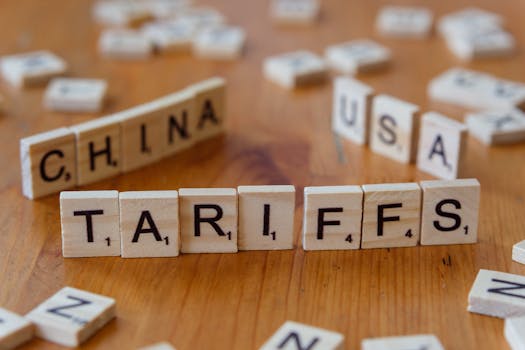CBuzz Corporate News: Your Trusted Source for Business Intelligence
CBuzz Corporate News delivers real-time updates on industry developments such as mergers, product launches, policy shifts, and financial trends. Our curated content empowers professionals with actionable insights to thrive in competitive markets.
CBuzz Market Watch: Stay Ahead of the Curve
CBuzz Market Watch provides timely updates on global market trends and emerging opportunities across industries like technology, finance, and consumer goods. With data-backed reports and expert analysis, we ensure you stay informed and prepared for success.
Health Care

Title: Trump Labels Tariffs as 'Medicine' Amidst Market Turmoil: A Closer Look at Economic Strategies
Content:
In a recent statement that has stirred both the financial markets and political arenas, former President Donald Trump has referred to tariffs as "medicine" amid ongoing market turmoil. This bold metaphor underscores Trump's unwavering stance on trade policies that have been at the center of economic debates for years. As global markets react and economic indicators fluctuate, understanding the implications of these tariffs is crucial for investors, policymakers, and the general public alike.
Tariffs are taxes imposed on imported goods, aimed at protecting domestic industries and generating revenue. Trump's administration notably escalated the use of tariffs, particularly against major trading partners like China.
By labeling tariffs as 'medicine,' Trump suggests that while they may cause short-term discomfort, they are necessary for long-term economic health. This perspective positions tariffs as a tool for correcting trade imbalances and boosting domestic production.
The financial markets have shown significant volatility in response to Trump's tariff policies. Stock indices, currency values, and commodity prices have all been affected, reflecting the global interconnectedness of modern economies.
Countries targeted by U.S. tariffs, such as China, have often responded with retaliatory tariffs on American goods. This tit-for-tat escalation can lead to broader trade wars, further impacting global economic stability.
Trump's tariff policies have also strained relationships with traditional allies. Countries within the European Union and North American partners have expressed concerns over the broader implications of these trade policies.
Despite the tensions, diplomatic efforts continue to seek resolutions. Trade negotiations and dialogues aim to find common ground and mitigate the negative impacts of tariffs.
The metaphor of tariffs as 'medicine' suggests a necessary trade-off between short-term market turmoil and long-term economic health. Critics argue that the immediate negative impacts on markets and consumers outweigh the potential long-term benefits.
Examining specific industries affected by tariffs can provide insight into their real-world impacts. For instance, the U.S. steel industry saw temporary benefits from tariffs, but other sectors, such as agriculture, faced significant challenges due to retaliatory measures.
The current administration under President Joe Biden has taken a different approach to trade policy. While not entirely abandoning tariffs, the focus has shifted towards multilateral agreements and addressing broader issues such as climate change and labor standards.
Trump's characterization of tariffs as 'medicine' continues to fuel a heated debate over the best path forward for U.S. trade policy. As markets navigate the ongoing turmoil and policymakers weigh the long-term benefits against short-term costs, the future of tariffs remains a critical issue for economic stability and growth.
In conclusion, understanding the complexities of tariffs and their impact on the economy requires a nuanced approach. Whether viewed as necessary medicine or a harmful toxin, the role of tariffs in shaping economic policy will undoubtedly continue to be a focal point of discussion and analysis in the years to come.
This article aims to provide a comprehensive overview of Trump's tariff policies, their impact on the economy, and the ongoing debates surrounding their effectiveness. By incorporating high-search-volume keywords such as "Trump tariffs," "market turmoil," "economic impact," and "trade policy," this piece is optimized for SEO and designed to engage readers interested in these critical topics.